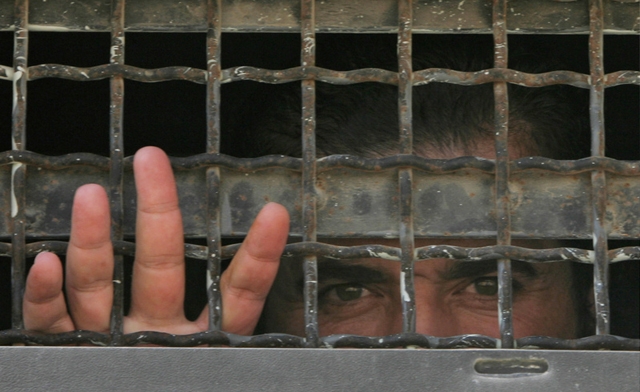On Palestinian Prisoners’ Day: 4,804 Palestinian political prisoners held in Israeli jails, including 14 women, 235 minors, and 536 serving life sentences
Supreme Court rejects prisoners' cases in brief decisions, contradicts prior case law
 Israel is currently holding 4,804 Palestinian political prisoners – classified by Israel as “security” prisoners – from the Occupied Palestinian Territories and Israel, as well as Arab security prisoners from the Golan Heights in its jails and detention facilities (Note: this number does not include security prisoners from other Arab countries). Security prisoners are classified separately from criminal prisoners and receive different treatment and greatly reduced rights and privileges. Of these 4,804, 14 are women and 235 minors (under the age of 18). 4,099 are from the West Bank (excluding East Jerusalem), 536 are from the Gaza Strip, 177 are from East Jerusalem, 170 are Palestinian citizens of Israel, and 2 are from the Golan Heights. The Israeli Prison Service (IPS) released these statistics on 9 April 2013 in response to a request submitted by Adalah Attorney Rima Ayoub.
Israel is currently holding 4,804 Palestinian political prisoners – classified by Israel as “security” prisoners – from the Occupied Palestinian Territories and Israel, as well as Arab security prisoners from the Golan Heights in its jails and detention facilities (Note: this number does not include security prisoners from other Arab countries). Security prisoners are classified separately from criminal prisoners and receive different treatment and greatly reduced rights and privileges. Of these 4,804, 14 are women and 235 minors (under the age of 18). 4,099 are from the West Bank (excluding East Jerusalem), 536 are from the Gaza Strip, 177 are from East Jerusalem, 170 are Palestinian citizens of Israel, and 2 are from the Golan Heights. The Israeli Prison Service (IPS) released these statistics on 9 April 2013 in response to a request submitted by Adalah Attorney Rima Ayoub.
Read the full statistics (.pdf)
Of the total 4,804 security prisoners in this group, 1,124 have been detained until the end of the legal proceedings against them, 159 are being held in administrative detention, and 546 are serving life sentences (455 of whom are from the West Bank, 27 are from East Jerusalem, and 18 are Palestinian citizens of Israel). 2,627 have been tried and are serving sentences of various lengths.
Supreme Court supports blatant discrimination
On Palestinian Prisoners' Day, Adalah wishes to draw attention to the blatant discrimination against security prisoners by Israel’s General Security Services (GSS or Shabak) and the IPS. The Supreme Court of Israel has supported these discriminatory policies, and has deemed them reasonable and justified.
The Supreme Court's role in defending the rights of security prisoners has descended from bad to worse in the past decade, and the decisions issued by the court clearly indicates that the judiciary prefers not to intervene in cases of violations of Palestinian prisoners' basic rights.
Court upholds rights violations on technicalities
In a ruling issued in February 2013, the Supreme Court rejected Adalah's petition against a 2003 "temporary order" that exempts the GSS and police from recording interrogations of suspects of security offenses. Interrogations of suspects of serious crimes are recorded to prevent severe violations of their due process rights, the use of torture and ill-treatment, and to guard against false confessions.
The court justified its decision not on the basis that the law is justified, but on the pretext that the law is a temporary order and will be amended in the future. The court defers decisions this way on many issues, and ruled similarly in a petition against a military order that allows the re-arrest and detention of a prisoner who has already been released in a prisoner exchange deal.
Court encourages deals instead of judgments
In many other petitions against prison conditions, the Supreme Court pressures the parties – most often the petitioners and the IPS – to reach deals to avoid criticizing or even adopting a position towards violations of the rights of Palestinian prisoners. For example, in a joint petition submitted by Adalah that challenged the harsh conditions in which prisoners were transported in IPS vehicles, including transporting them for long hours without food, water, or toilet breaks, and without special treatment for sick prisoners, the court ordered the petitioners to withdraw after claims that the problems with the conditions had been improved. The court did not criticize the original conditions, or even observe the transportation conditions to confirm that they were not poor.
Decisions disregard basic principles of precedent and law, allows "acceptable discrimination"
Adalah adds that the court has recently ignored basic principles, such as that the punishment for a prisoner is imprisonment and revocation of his freedom of movement, and that additional punishments should not be added. In a hearing on a prisoner's appeal against the prevention of his access to higher education at the Open University, the court decided that discrimination between security and criminal prisoners is "acceptable discrimination." In this brief, unexplained decision, the Supreme Court affirmed completely the IPS's policy to prevent security prisoners from pursuing education.
For questions to Adalah's lawyers, please contact Media Coordinator Salah Mohsen: 0525950922
Photo used under Creative Commons by Physicans for Human Rights - Israel.














